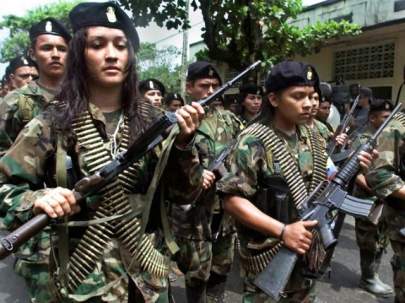Colombia: Terrorists Announce Death of Ex-Congressman FARC Drug Lord

Members of the Revolutionary Armed Forces of Colombia (FARC), a communist terrorist organization, announced the death of senior member “Jesús Santrich” on Tuesday.
Santrich, a key figure in the brokering of a “peace deal” between the FARC and the Colombian government, held an uncontested Congressional seat in the country before deciding to return to terrorism.
Santrich’s abandonment of his position in Congress followed an indictment against him, real name Seuxis Pausias Hernández Solarte, by the Department of Justice in 2018 that accused him of leading a plot to smuggle over 22,000 pounds of cocaine into the United States. The FARC “peace deal” he helped broker was signed in 2016, meaning the Department of Justice believed he remained active in drug trafficking long after vowing to abandon the practice in exchange for a generous amnesty agreement.
Colombia had approved Santrich’s extradition to the United States less than a week before his alleged death, though authorities had no evidence he was still in the country. The U.S. government was offering a $10 million reward for information leading to Santrich’s capture as of this week.
The FARC has terrorized Colombians for over half a century, leading both a violent terrorist plot to overthrow the legitimate government of the country and one of the world’s most lucrative drug trafficking operations. The FARC’s war on Colombians killed over 260,000 prior to the “peace deal” — and likely many more who disappeared without ever being found. The FARC is also responsible for decades of child kidnappings, the use of child soldiers in terrorism, and mass child rape that led to a regular practice of forced abortions on minors.
Following the signing of the FARC “peace deal,” mainstream media outlets began referring to terrorists like Santrich who remained committed to the FARC’s traditional operations as “dissidents.”
“We inform Colombia and the world with pain in our hearts of the sad news of the death of Commander Jesús Santrich … in an ambush executed by Colombian military commandos on May 17,” an official statement from the FARC “dissident” wing published on Tuesday read. The statement identified Colombian President Iván Duque as personally responsible for the ambush, reportedly taking place in Venezuela, thus accusing Duque of invading a neighboring country. The Venezuelan socialist regime has maintained friendly ties with the FARC for decades.
“The news of Santrich’s death will not save the arrogant tyrant Duque from the unleashed people’s wrath,” the statement continued, referencing nationwide leftist riots in Colombia.
Colombian news outlets reported that sources close to the FARC appeared to confirm that Santrich was dead and that he died in Venezuela, but not that his death had any ties to Colombian military activity. The Colombian newspaper El País, citing the magazine Semana, reported that Santrich died “in a confrontation among illegal armed groups,” not in a Colombian military operation. The newspaper added that the Duque administration had not confirmed Santrich’s death or the situation that led to it.
“Intelligence information indicates that in alleged confrontations occurring yesterday in Venezuela, alias ‘Santrich’ died, among other delinquents,” Colombian Defense Minister Diego Molano said in a statement posted to Twitter. “Information under verification. If this fact is confirmed, it proves that narco-criminals take refuge in Venezuela.”
On Wednesday, Colombian outlets began circulating reports that the dispute that led to Santrich’s death was the product of criminals in Venezuelan attempting to detain him to acquire the lucrative U.S. reward offered for his capture. The Venezuelan NGO Fundaredes relayed information from sources in Zulia state, Venezuela, where Santrich allegedly died, that the FARC and the National Liberation Army (ELN), another Marxist terrorist organization active in the region, were struggling for control of territory there and that Santrich was personally involved in attempts to build up a guerrilla force to expand his power. The sources also suggested that the $10 million reward offered was simply too high for some within the terrorist group to resist. Bogotá has not offered any more information at press time regarding these reports. The Fundaredes report contradicts earlier reports that the ambush occurred in Apure state, elsewhere in Venezuela.
Santrich returned to terrorism after his arrest in Colombia following the U.S. indictment against him for drug trafficking. In May 2019, Colombia’s Supreme Court ruled authorities could not keep Santrich behind bars, despite concerns that he represented a flight risk, because of a jurisdictional issue. Since Santrich still technically held a Congressional seat, only the Colombian Supreme Court could process him for a crime, the court ruled.
By September of that year, Santrich had disappeared and resurfaced in a terrorist propaganda video authorities believed was filmed in Venezuela. Santrich and fellow FARC leader “Iván Márquez” called for a communist uprising against Duque’s government and Santrich himself personally threatened Duque’s life in subsequent messages.
“I am not afraid of threats from delinquents,” Duque said in response at the time. “We will keep fighting them ceaselessly in defense of the Colombian people.”
Source: https://www.breitbart.com/latin-america/2021/05/19/colombia-terrorists-announce-death-ex-congressman-farc-drug-lord/











